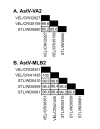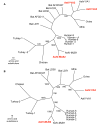Human stool contains a previously unrecognized diversity of novel astroviruses
- PMID: 19814825
- PMCID: PMC2765957
- DOI: 10.1186/1743-422X-6-161
Human stool contains a previously unrecognized diversity of novel astroviruses
Abstract
Human astroviruses are a leading cause of gastrointestinal disease. Since their discovery in 1975, 8 closely related serotypes have been described in humans, and more recently, two new astrovirus species, astrovirus MLB1 and astrovirus VA1, were identified in diarrhea patients. In this study, we used consensus astrovirus primers targeting the RNA polymerase to define the diversity of astroviruses present in pediatric patients with diarrhea on two continents. From 416 stool specimens comprising two different cohorts from Vellore, India, 35 samples were positive. These positive samples were analyzed further by either sequencing of the approximately 400 bp amplicon generated by the consensus PCR or by performing additional RT-PCR specific for individual astroviruses. 19 samples contained the classic human astrovirus serotypes 1-8 while 7 samples were positive for the recently described astrovirus MLB1. Strikingly, from samples that were positive in the consensus PCR screen but negative in the specific PCR assays, five samples contained sequences that were highly divergent from all previously described astroviruses. Sequence analysis suggested that three novel astroviruses, tentatively named astroviruses VA2, MLB2 and VA3, were present in these five patient specimens (AstV-VA2 in 2 patients, AstV-MLB2 in 2 patients and AstV-VA3 in one patient). Using the same RT-PCR screening strategy, 13 samples out of 466 tested stool specimens collected in St. Louis, USA were positive. Nine samples were positive for the classic human astroviruses. One sample was positive for AstV-VA2, and 3 samples were positive for AstV-MLB2 demonstrating that these two viruses are globally widespread. Collectively, these findings underscore the tremendous diversity of astroviruses present in fecal specimens from diarrhea patients. Given that a significant fraction of diarrhea etiologies is currently unknown, it is plausible that these or other yet unrecognized astroviruses may be responsible for at least part of the undiagnosed cases.
Figures



Similar articles
-
Prevalence of classic, MLB-clade and VA-clade Astroviruses in Kenya and The Gambia.Virol J. 2015 May 15;12:78. doi: 10.1186/s12985-015-0299-z. Virol J. 2015. PMID: 25975198 Free PMC article.
-
Multiple astrovirus MLB1, MLB2, VA2 clades, and classic human astrovirus in children with acute gastroenteritis in Japan.J Med Virol. 2016 Feb;88(2):356-60. doi: 10.1002/jmv.24337. Epub 2015 Aug 6. J Med Virol. 2016. PMID: 26212039
-
Comparison of novel MLB-clade, VA-clade and classic human astroviruses highlights constrained evolution of the classic human astrovirus nonstructural genes.Virology. 2013 Feb 5;436(1):8-14. doi: 10.1016/j.virol.2012.09.040. Epub 2012 Oct 16. Virology. 2013. PMID: 23084422 Free PMC article.
-
Novel human astroviruses: Novel human diseases?J Clin Virol. 2016 Sep;82:56-63. doi: 10.1016/j.jcv.2016.07.004. Epub 2016 Jul 11. J Clin Virol. 2016. PMID: 27434149 Review.
-
The changing epidemiology of astrovirus-associated gastroenteritis: a review.Arch Virol Suppl. 1996;12:287-300. doi: 10.1007/978-3-7091-6553-9_31. Arch Virol Suppl. 1996. PMID: 9015126 Review.
Cited by
-
Detection and Molecular Characterization of Porcine Teschoviruses in India: Identification of New Genotypes.Indian J Microbiol. 2024 Sep;64(3):963-972. doi: 10.1007/s12088-023-01173-7. Epub 2024 Jan 2. Indian J Microbiol. 2024. PMID: 39282184
-
The astrovirus N-terminal nonstructural protein anchors replication complexes to the perinuclear ER membranes.PLoS Pathog. 2024 Jul 15;20(7):e1011959. doi: 10.1371/journal.ppat.1011959. eCollection 2024 Jul. PLoS Pathog. 2024. PMID: 39008516 Free PMC article.
-
Hecatomb: an integrated software platform for viral metagenomics.Gigascience. 2024 Jan 2;13:giae020. doi: 10.1093/gigascience/giae020. Gigascience. 2024. PMID: 38832467 Free PMC article.
-
Assessing the Prevalence of Astroviruses in Water Environments: A Systematic Review and Meta-analysis.ACS ES T Water. 2023 Nov 15;3(12):3782-3789. doi: 10.1021/acsestwater.3c00415. eCollection 2023 Dec 8. ACS ES T Water. 2023. PMID: 38094915 Free PMC article. Review.
-
Diversity of classic and novel human astrovirus in outpatient children with acute gastroenteritis in Shanghai, China.Front Microbiol. 2023 Nov 13;14:1265843. doi: 10.3389/fmicb.2023.1265843. eCollection 2023. Front Microbiol. 2023. PMID: 38029144 Free PMC article.
References
-
- Kirkwood CD, Clark R, Bogdanovic-Sakran N, Bishop RF. A 5-year study of the prevalence and genetic diversity of human caliciviruses associated with sporadic cases of acute gastroenteritis in young children admitted to hospital in Melbourne, Australia (1998-2002) J Med Virol. 2005;77:96–101. doi: 10.1002/jmv.20419. - DOI - PubMed
Publication types
MeSH terms
Substances
Associated data
- Actions
- Actions
- Actions
- Actions
- Actions
- Actions
- Actions
- Actions
- Actions
Grants and funding
LinkOut - more resources
Full Text Sources
Other Literature Sources
Medical
Research Materials

